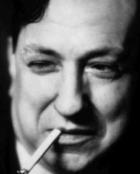
Born in New Caledonia in 1886. After his family returned to France and passed through various provincial cities, he finally arrived in Paris at the age of 24. He frequents Montmartre and especially the Le Lapin Agile cabaret, where he meets Picasso, Mac Orlan and Dorgelès. He founded the fantaisiste school (1911) and published the collection of poems La Bohême et mon cœur (1912). He collaborates in the magazines L’Homme libre and Gil Blas. In 1914, with the help of Rachilde, his first novel Jesús el Palomo was published, it will be the first time that, in the French novel, male homosexuality, a precursor source, was openly discussed, which would later influence the narrative of Jean Genet. Carco's Paris is the Paris-cape, the one that generates in its environment an unconventional fauna, a Paris of cabarets in which the sex trade circulates in all directions. There he goes with Colette, walks Rachilde or spends the night with Katherine Mansfield. Art critic, author of novels, short stories, reports, biographies, and respected songwriter, Carco, the "writer of the Apaches," was one of the most widely read of the interwar period. Member of the Goncourt Academy since 1937. He died in Paris in 1958.





